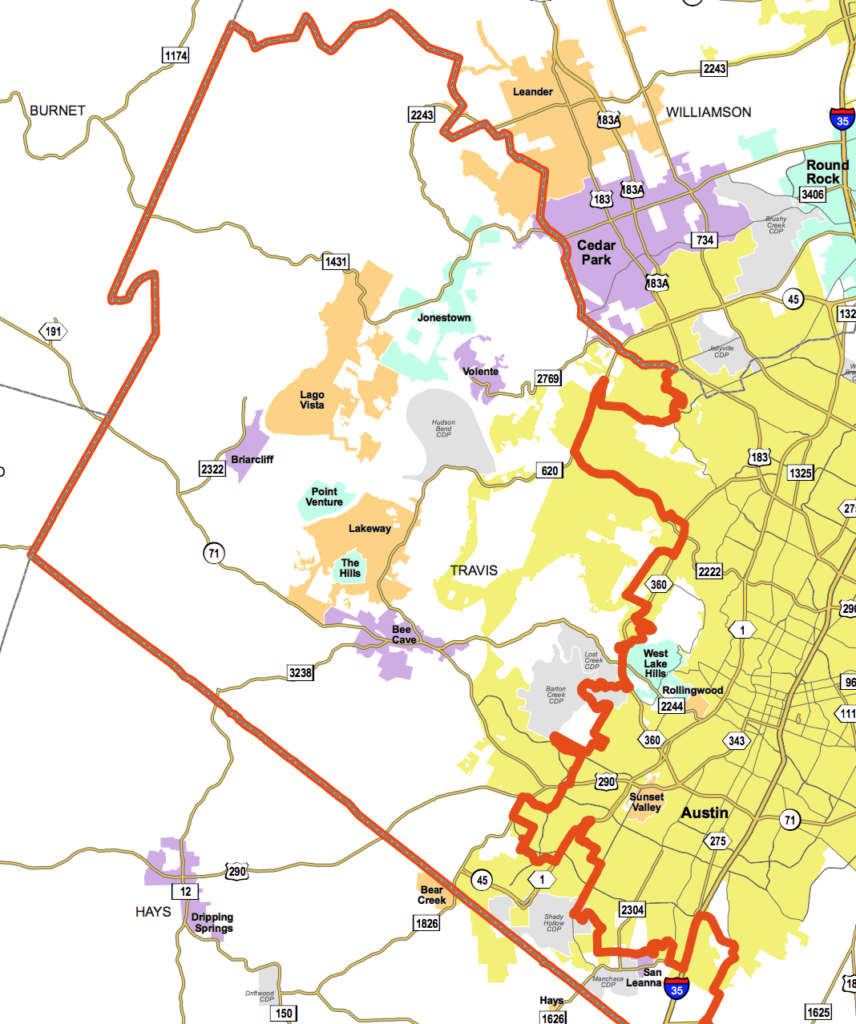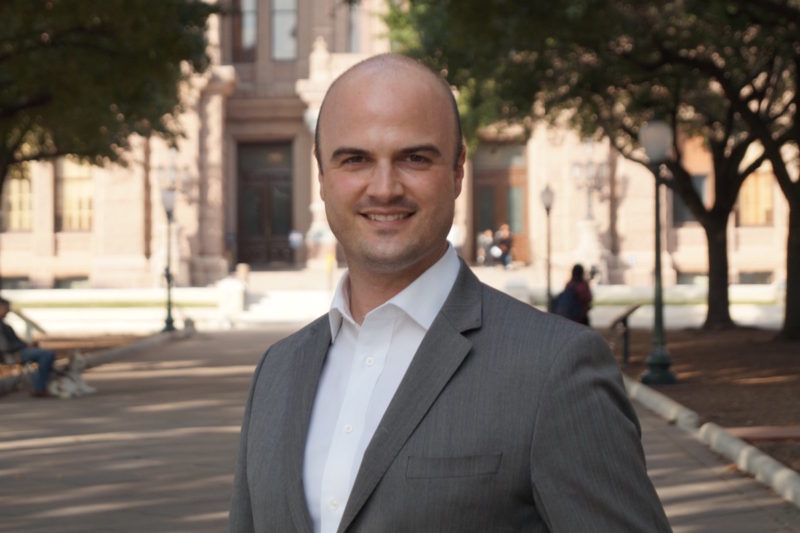Republican Aaron Reitz, a candidate for the Texas House of Representatives, is running on a platform of checking the power of city and county governments, including the City of Austin and Travis County, whose policies he describes as “out of control.”
His candidacy plays up long-running tensions between liberal city governments and Texas’ conservative state government, which have boiled over in recent conflicts over homeless camps in Austin, local funding for abortion providers, local paid sick leave ordinances, inter-governmental lobbying, and more.
The seat for which Reitz is running, HD-47, is held by Rep. Vikki Goodwin, who won in 2018 with only a slim majority – 52.4% of the vote – becoming the first Democrat to hold the seat since its creation in 2011.
Her win was part of a ‘blue wave’ in 2018, which swept a dozen House Republicans from office, including many who represented wealthy, suburban areas like HD-47. The district includes western portions of Austin as well as Bee Cave, Lakeway, Lago Vista, and Jonestown.
Prior to 2018, HD-47’s long-time GOP incumbent Paul Workman had won his reelection bids fairly easily, scoring a 12% margin of victory in 2016 and running unchallenged in 2014 but for a Libertarian candidate.

Now Republicans are hoping to reverse 2018’s losses in former strongholds like HD-47. In order to win the seat, Reitz will first need to defeat four Republican primary opponents: Austin police officer Justin Berry, attorney Jennifer Fleck, attorney Jenny Roan Forgey, and former City Council Member Don Zimmerman.
In an interview, Reitz spoke about his background, themes that he’s encountering on the campaign trail, and his general election opponent. We also discussed a number of critical statewide issues, including proposals from both the right and the left for preventing mass shootings, judicial selection reform, property taxes, and education finance.
Reitz is a former U.S. Marine Corps Officer and lawyer. He says he’s running for state representative because “the state and its political trajectory stands on the brink.” He’s worried about a takeover by liberals and says he wants to join the fight to prevent that from happening.
Tell me a little about yourself – what experiences have prepared you for the job of legislator?
I’m originally from San Antonio, I was in the Corps of Cadets at A&M, served for about five years as an active-duty Marine officer, and deployed to the Helmand Province. I was on an embedded training team with the Afghan National Army. My son was born during that time and later we had a daughter. I got out as a captain, moved back to Texas, came here to law school at the University of Texas.
During my third year of law school I was editor-in-chief of a law journal called the Texas Review of Law and Politics. I graduated from law school and thought that I wanted to be a so-called deal lawyer doing mergers and acquisitions, so I joined a great law firm, but wasn’t super happy about the work. When Governor Abbott appointed his general counsel Jimmy Blacklock to the Texas Supreme Court, I joined Blacklock as his inaugural law clerk, and I clerked for him from January 2018 through May of 2019.
If I’m elected, I’ll be the only Marine in the House, and the only former Texas Supreme Court clerk in either chamber of the Texas Legislature. I think that that lends some credibility to my ability to get my mind wrapped around our statutory and administrative regimes.
What are some substantive differences between you and Rep. Vikki Goodwin?
Vikki Goodwin voted against property tax reform, HB 2. Aside from all the merits of the bill, which I support, HD-47 is one of the most property-wealthy districts in the state and folks who live in western and southwest of Travis County pay astronomically high property taxes. So Rep. Goodwin’s vote against HB 2 makes her particularly vulnerable. I would have voted for HB 2 and I hope to see property taxes continue to go down.
Second, she failed to support the Born-Alive Infant Protection Act (HB 16). ‘Born alive’ abortion is something that even folks who believe abortion should be ‘safe, legal and rare’ – like the old Clinton saying – find to be absolutely abhorrent.
She voted against the constitutional ban on a state income tax, Prop 4, that was up on the ballot this time around, and won the overwhelming support of 74% of Texans.
Finally, also voted against the expansion of the School Marshal Program, which would keep our schools safer by making it harder to commit school shootings, which are unfortunately becoming more common.
What are one or two things that you think y’all could agree on?
Goodwin was in support of an end to forced annexation, which is something that I’m supportive of. I think also she’s been supportive of legislation increasing the criminal penalties for sending unwanted lewd photos (HB 2789). But there’s very little that we agree on in terms of marquee legislation.
Would you have voted for House Bill 3, the school finance reform bill?
Yes. I like what the bill did with respect to reducing Robin Hood, which people in my district care quite a bit about. And I like that it helped to more fully resource our classroom teachers. Too often, school district bureaucracies get to enjoy the bloat of big educational spending, so I’m glad to see that under this bill our teachers are being paid more.
If the opportunity arose in the 87th Legislature to fund that again, would you vote for that?
I’d have to take a look at the numbers on that. I don’t think I’m prepared to say whether I would just sign off again on it. With my fiscally conservative political principles coming to bear on this particular bill, I may say, we want to give it some thought. I’m interested in continuing that trajectory, but not necessarily obligating myself to everything.
Where do you stand on a ban on taxpayer-funded lobbying?
I am 100% for a ban on taxpayer-funded lobbying. I intend to help on that in the 87th, and I expect that it will get introduced earlier in the session and that there will be much stronger support for it this time, or at least more time to build a coalition around it.
Do you think it’s possible for Democrats and Republicans to find any common ground on guns?
I don’t know. I’m skeptical. I think that we should still pursue common ground, but I am concerned when the prevailing sentiment in Democratic circles is, ‘Hell yeah, we’re going to take your AR-15s.’ I just don’t know that I can work with folks who are willfully ignorant about gun definitions. As a Marine, I have a strong firearm vocabulary and understanding. And I’ll tell you, there is no such thing – in a legal sense – of an ‘assault weapon,’ per se. Other than the way the weapon looks, an ‘assault weapon’ is still a semi-automatic weapon just like the others: you pull the trigger once and one bullet comes out.
Point being it would be difficult to legislate restrictions around that?
Well, there’s so much to say. I think, number one, that gun control is one of those things that begins with the best of intentions and is truly just impossible to legislate around – whether it’s definitional problems, or registration problems, or constitutional problems. I am always the type of guy to try to work across the aisle, but on guns it’s going to be very, very difficult.
Where do you stand on constitutional carry, which is something that probably a certain subset of primary voters care more about than the general electorate?
I would support a constitutional carry bill in the legislature. But I will tell you that when I talk with the residents of HD-47, this is not something that registers extremely high on their particular priority list. So I’ll support it, but I think that the residents of HD-47 are particularly interested in some other pieces of legislation as well.
Last question about guns: Do you think a red flag law could be legislated here in Texas?
Red flag laws are quintessentially good intentions, bad execution type of legislation. I sympathize with the hearts of many Americans and Texans who say, well gosh, if only we had the ability to sort of flag this person or whatever, we would have been able to prevent a mass shooting. However, when you start to game a red flag regime out, you realize that what we are doing is granting the judiciary and the community in which the judiciary is located with incredible amounts of power.
I just don’t see how you have a red flag law regime that gives respect to due process, is adjudicable, and actually does what it’s intended to do. What I think can actually stop school shootings is when we expand the Texas School Marshal program, where teachers who are qualified go through training to maybe carry in a way that doesn’t disrupt the academic environment.
What are your thoughts on proposals to end partisan judicial elections?
On the one hand, I have a democratic impulse that causes me to respect the elective judiciary that we have, as it stands right now. On the other hand, a hallmark of an independent judiciary is independence, and I just don’t know that you can get that when it’s elected just like the legislature or the executive branch, and in a partisan way, which requires judges to sort of show their hand before a case even comes before that.
Having clerked on the Texas Supreme Court for a year and a half, I worked with some highly qualified, ultra-professional judges, and I did not see politics play a role in their decision making. But that’s also at the highest court in the land in Texas; I don’t know to what extent that happens on courts of appeals or district courts or elsewhere. I think that it is more likely that partisan mischief occurs in the lower courts.
If we were to eliminate partisan judicial elections, it would probably solve a lot of those problems. I think that the need for an independent unbiased judiciary probably outweighs the need for the people to vote on every single branch of government.
Based on your experience campaigning thus far, what are some of the issues shaping the primary race?
I am hearing from a lot of folks who are unhappy with the Austin Independent School District (AISD), including those who are are protesting the AISD sex ed curriculum. I think that local activists should continue to put pressure on school districts, but the statewide policy prescription that resonates with folks who are interested in pulling their kids out of AISD is a robust school choice agenda.
The Austin homelessness issue is also shaping the primary. I am the only candidate in the Republican field who has said that on day one of the 2021 legislative session, I will file a statewide ban on San Francisco-style homeless ordinances.
Bottom line is, Austin City Government – and big city governments in general – are hijacking the levers of power in this state. And they are repeating exactly what California’s political history was 30 or 40 years ago. In California, the big cities with growing population were captured by the hard Progressive left, and they steered the state down a way that it cannot recover from. That is exactly what is happening in Texas.
What primary voters want is a legislator who is committed, not to taking over local governmental functions, but who provides a meaningful state check and balance to what is reasonably perceived as out-of-control, unaccountable local government. The theme of my campaign is to check and balance big city governments.
